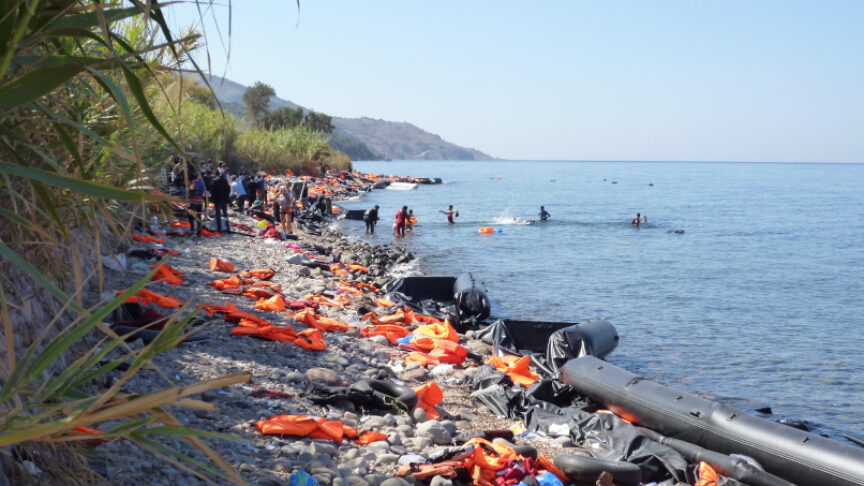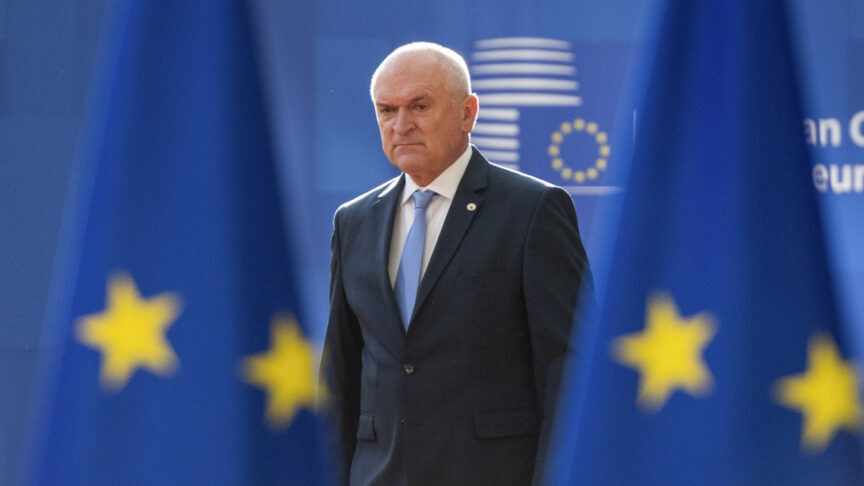Unending lockdown: Why aiding child refugees could strengthen the European project
Leaving these children in dire conditions endangers European values – but politically straightforward remedies are within reach.
Lesbos’s capital, Mytilini, is a quiet idyll – there is little indication in the town that just ten minutes away lies Europe’s “living hell”, the Moria refugee camp. Built in 2015 for 3,000 people, it now houses more than 20,000 migrants, including at least 1,200 unaccompanied children. Most child arrivals no longer make it into the camp, and are forced to live in tents or other makeshift accommodation in the surrounding area. If they are lucky, they are officially housed in closed sections of Moria designated for unaccompanied minors. Visiting these areas – with their locked gates, security guards, and barren courtyards – feels like visiting a prison. They are no place for children, and Europeans are slowly beginning to take notice.
Moria’s problems reflect the many contradictions inherent in the European Union’s approach to refugees. While European voters have become increasingly hostile to immigration, the indefinite detention of children in such conditions reflects poorly on politicians anywhere. Leaving the Greek government to deal with this mess alone will erode European solidarity and, eventually, destroy free movement within Europe. Yet there are several things that the EU can do to improve conditions in places such as Moria and the situation of unaccompanied minors in particular.
On 6 March 2020, the European Commission announced its Action Plan for Immediate Measures to Support Greece, which included up to €700 million in financial assistance. As the covid-19 pandemic shut down borders even within the eurozone, migrant policy followed suit – international cooperation on camp conditions has been superseded by attempts to prevent migrants from crossing Europe’s external border. Humanitarian efforts, then, have come from national governments, with countries such as Finland, France, Germany, Luxembourg, and Portugal pledging to take in 1,621 unaccompanied children from Greek camps. Responses to the pandemic have, however, stalled these commitments – with less than 200 relocations completed as of mid-July.
The first way that the EU can address these problems is to resume resettlement initiatives. This should not be a daunting task: the relocation of the 5,000 unaccompanied children in all Greek camps would, for example, account for only 0.003 per cent of annual immigration to Germany. While this would be a drop in the ocean for Germany, such a move would decrease the refugee population on Greece’s islands by around 10 per cent, mitigating potential pandemic risks and significantly easing the concerns of the local population.
To ensure the success of such efforts, the authorities should become more engaged with locals on a grassroots level. Community involvement is crucial to integration, as interaction with locals increases positive perceptions on both sides, decreases their anxiety, and improves health, employment, and education outcomes for migrants. Programmes that connect unaccompanied minors with guardians or buddies – such as those trialled in Antwerp, Tilburg, and Gent – have shown how effective this can be.
Moria’s problems reflect the many contradictions inherent in the European Union’s approach to refugees.
There is a lack of such engagement in Europe as a whole. However, as the coronavirus brought populations across Europe to a standstill, millions have decided to volunteer in their communities – and, crucially, many plan to continue doing so after the lockdown ends. As the immediate healthcare crisis dissipates, governments should ride this wave of solidarity by redirecting citizens’ attention towards helping unaccompanied minors. From informal tutoring to more official guardianship programmes, there are many ways for locals to contribute at the levels of involvement that suit them.
While they work towards this goal, European policymakers should simultaneously attempt to improve children’s experience within the camps. Housing, sanitation, medical facilities, and guardian training are important to this. But in a resource- and time-constrained environment, governments can use accessible education to achieve significant results with minimal investment. By improving children’s integration and employment potential, basic schooling can reduce long-term government spending on everything from interpreters to unemployment support. Yet only 6 per cent of migrant children across Greece’s islands currently have access to public schools. And remedial efforts by NGOs are unable to compensate for this – especially in light of the pandemic.
For the most part, direct enrolment into Greek-language public schools – especially in Lesbos, where migrants account for 20 per cent of the total population – is unrealistic. A more practical alternative would be to invest in facilities that provide education and critical language courses to all children directly in the camps. In current conditions, even the limited programmes that are available will run out of funding by the end of summer. Efforts to address this problem are affordable: it would require only €20 million, or 2 per cent of the funding pledged by the European Commission in March, to extend these programmes until 2022 and double the number of children they assist.
This is not an easy time for anyone. But, for children who are likely traumatised after fleeing their homes only to find themselves alone in unliveable camps such as Moria, things are far worse than they are for most Europeans. By relocating them to more hospitable locations and improving education within the camps, the EU can significantly improve their lives and decrease its long-term integration and support costs. As the trade-offs facing policymakers become increasingly complex, efforts to help unaccompanied minors may provide a small but tangible victory for all. With a minimal commitment, European governments can transform the lives of refugees, safeguard the well-being of their constituents, and strengthen the foundations of the European project.
The European Council on Foreign Relations does not take collective positions. ECFR publications only represent the views of their individual authors.



